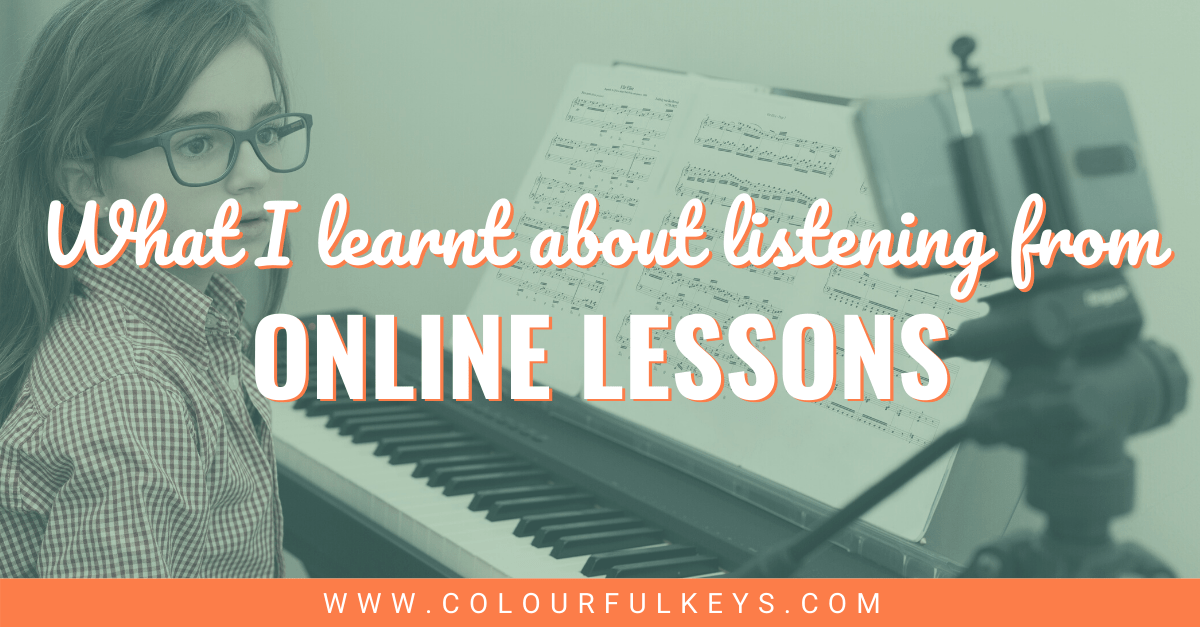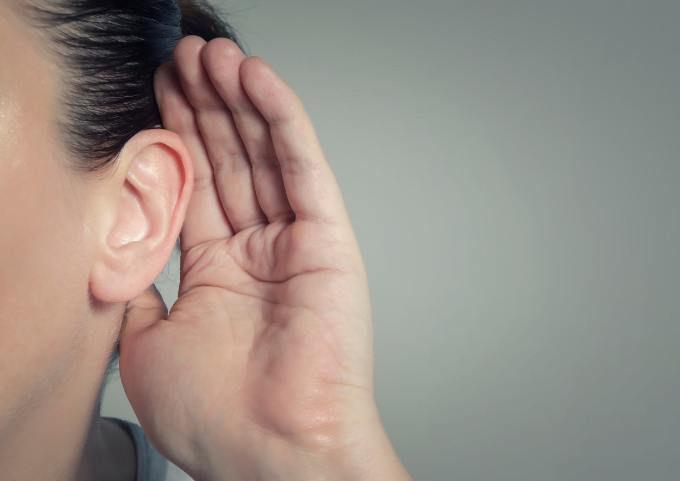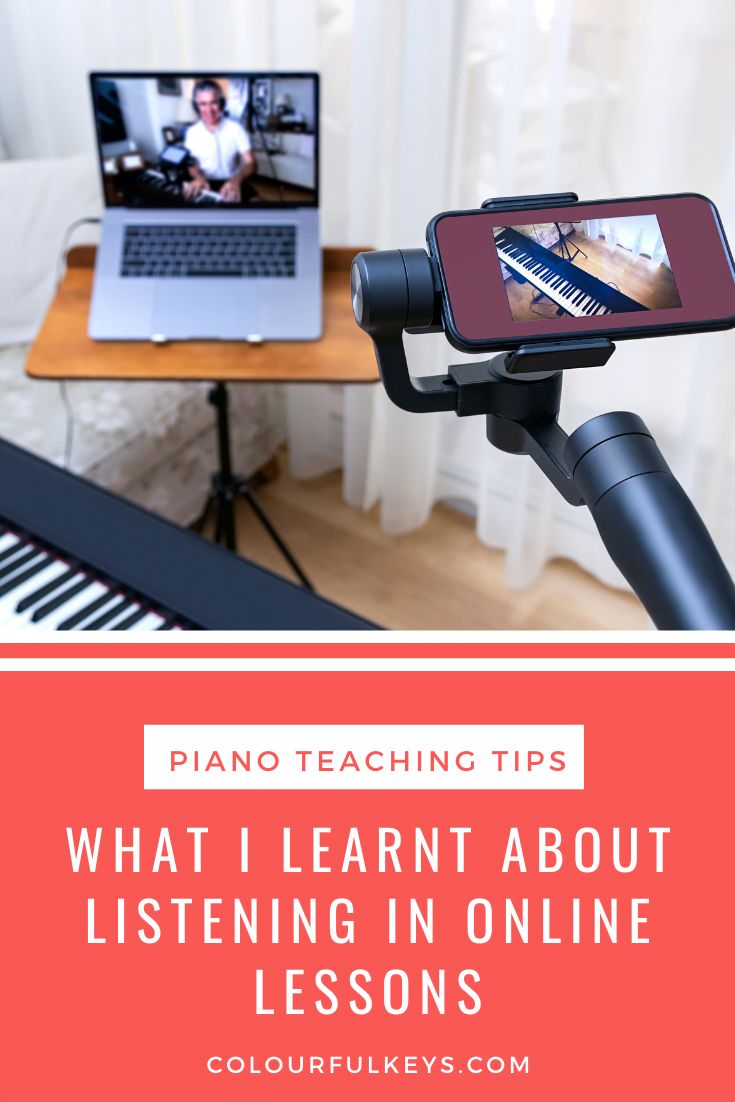I think it’s fair to say that we all learnt a lot in 2020. Some of the biggest lessons for me last year were about listening…and Zoom was my teacher. 🙃

⬆️ Listen to the podcast above or keep on reading, whichever fits your style. ↙️
It’s been about a year since the widespread lockdowns began in most of the world due to the pandemic. Roughly 54 weeks (give or take) since my own studio went fully online for the first hard lockdown in Ireland.
Now that I have some distance, I want to take this opportunity to reflect on what I learnt about listening from going in and out of online piano lessons. I hope that it will inspire you to note down a few of your own learnings to help you in your teaching, whether live or online.
We Use Our Eyes to Listen
The first shock for many of us when we went online was quite how tricky it was to hear and see what our students were doing.
I sent instructions to the parents in my studio about how to set things up and they definitely did their best given the short notice of the switch. But at first, I was really straining to hear.
And I realised: I was straining with my eyes as much as with my ears.
It wasn’t just that I couldn’t hear as clearly because Zoom was compressing the sound. I believe a lot of the trouble many of us had hearing our students in online lessons was because we were missing visual cues.
We all know that it’s a completely different experience to watch a live performance than to only hear one. Why is that?

It’s because we hear with our eyes. We rely on all our senses to help our students succeed, and it’s hard for most of us to hear fully when we can’t see the full picture.
Understanding this has taught me to describe things to my students as clearly as possible. I knew that they didn’t have the full visual or auditory picture on their end either, and that young students wouldn’t be able to fill in the blanks.
So I did it with my words.
I described each movement or sound clearly before and after I performed it. I believe that made a big difference to our lesson pace and their overall progress.
My Ears Are Better Than I Know
When I couldn’t see what was going on because of the angle, webcam quality or internet connection on my student’s end, I was forced to use my ears.
I’m a music reader, first and foremost. I’m used to trusting my analytical brain to think through the music.
Although I’m passionate about including improvisation and playing-by-ear in my lessons, this is not my go-to mode.
But when I was compelled to rely on my ears, I discovered they deserve far more credit than I give them.
At first, I would cautiously say things like, “Um, I think you might be playing a 4th instead of a 3rd there?” and as I gradually realised my guesses in the dark (literally) were accurate, I grew in confidence.
Even without context, even when I didn’t have my student’s book to refer to due to postage issues, my ears were up to the task. 😃

This made me so thankful for the investment I’ve put into my own ear training over the last several years. It also made me excited to do more.
This gives us a window into how important the feeling of competence is for our students. When we feel good about how far we’ve come, it can spur us on and lift us into 5th gear.
We Need the Right Words to Navigate
Let’s be honest, vocabulary can feel stuffy. The umpteenth time we have our students repeat the word crescendo, or correct them when they mix up treble and bass clefs, we can feel like a stick-in-the-mud.
But online lessons revealed a very good reason to care about words.
Our students who didn’t understand the difference between a bar/measure and a line had no idea how to navigate the score without us pointing.
(That particular issue is why we created the game Rainbow Race. You’re welcome. 😉)
It might not be the most fashionable thing to extol the importance of accurate vocabulary. But it matters.
That’s why Vibrant Music Teaching members have access to so many games about music terms in the Resource Library. All these little words are important, and we have to find ways to drill them with students to make their studies flow forward.
We Need to Listen to the Parents
The most common lesson I’ve heard from teachers about their online lesson switchover was about their student’s home setup. They discovered the student’s practice instrument, bench, footstool or stand was not what they thought. It was a real shock for many.
This discovery underlines the importance of building strong relationships with the parents in your studio. You can’t just teach the child – you have to teach the parents too.
What did you learn from online lessons?
Share your lessons in the comments below.
Need help teaching ear training skills to your students? You’ll love the Ear Training resources from my Music Theory hub page!

Hi, I´m from Chile, My name is Luis Martínez
and I fall in love with your blog. I´m working online
and has been a new challenge foy the students and
me as a teacher. I can learn to “”see”” what are hearing
and in wich way they preffer to hear an learn the music.
Thanks for your videos and your podcasts.
They has been very usefull to learn new strategies
to teach music.
A big Hug from Chile
Luis